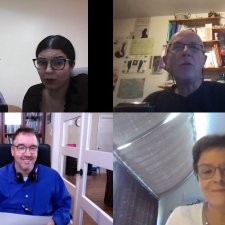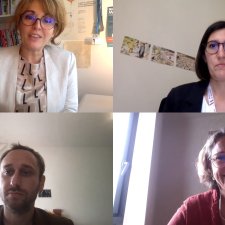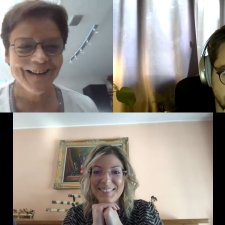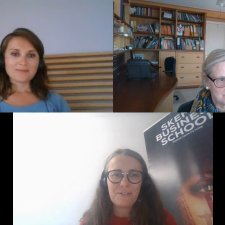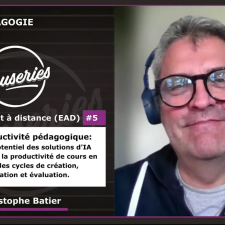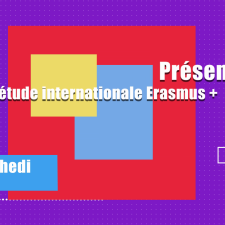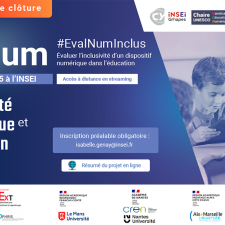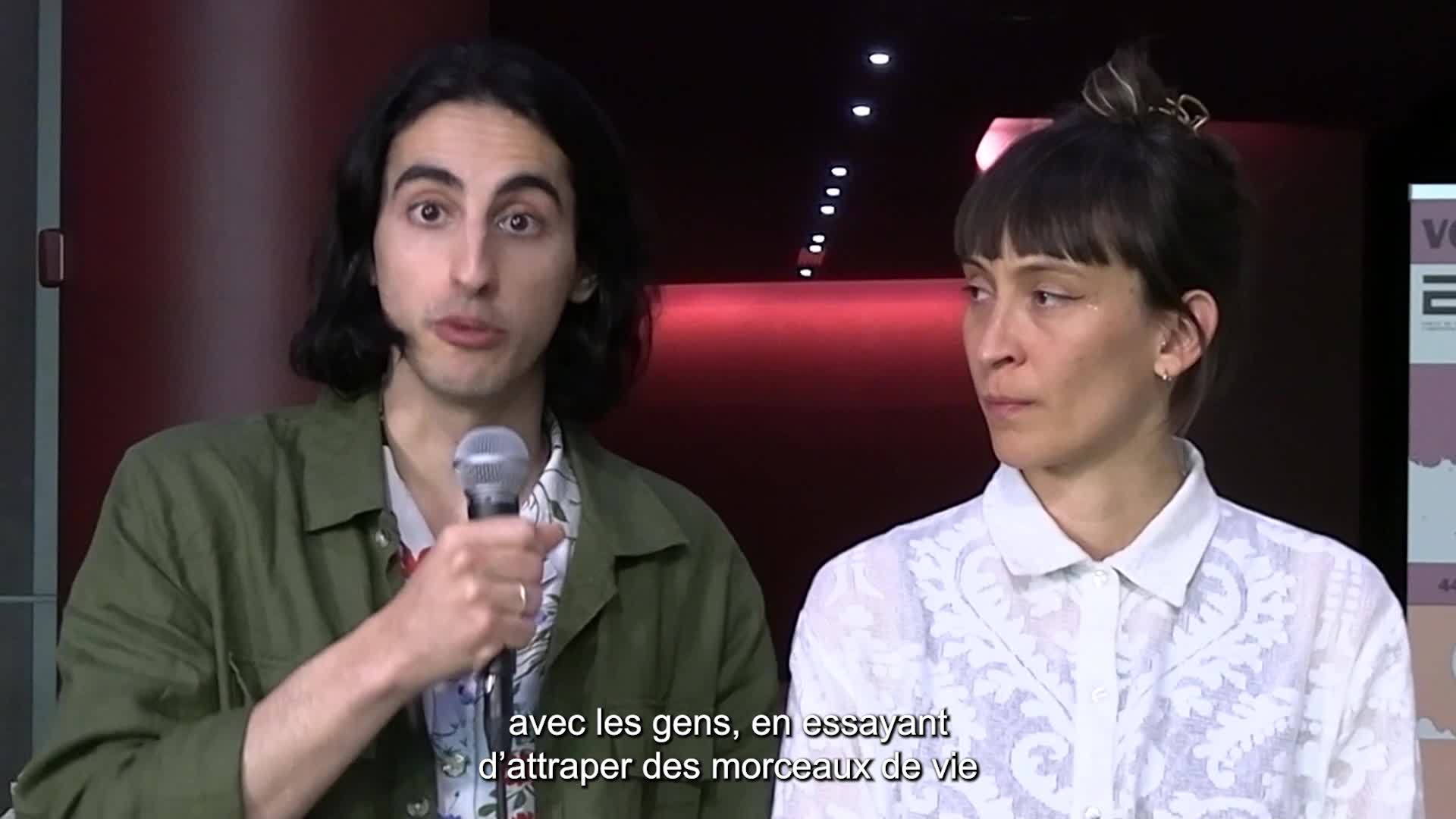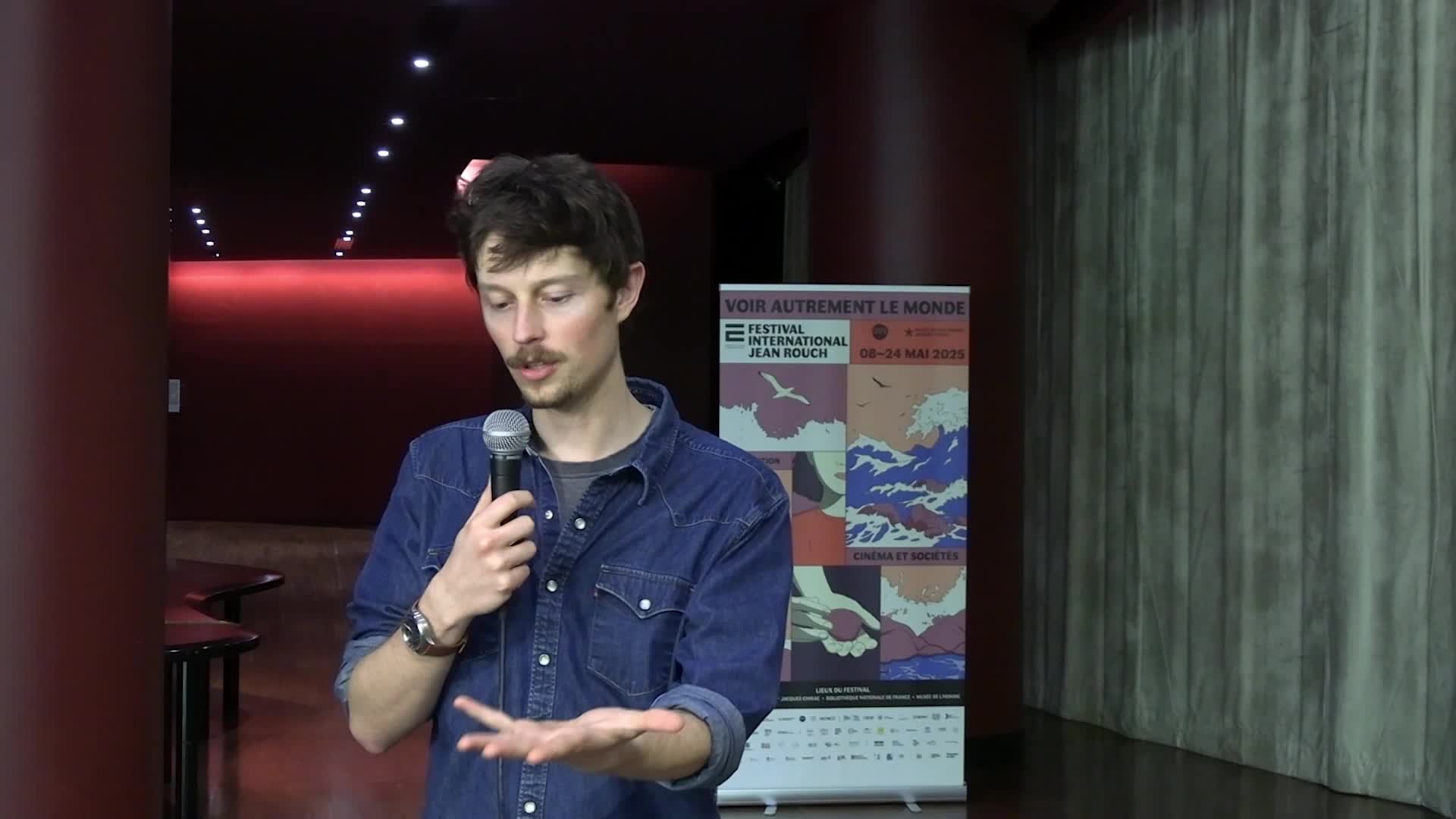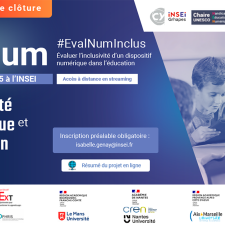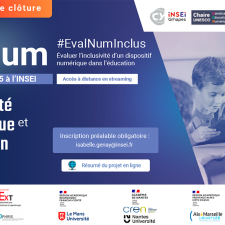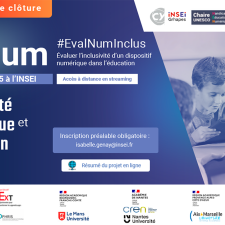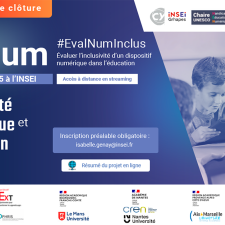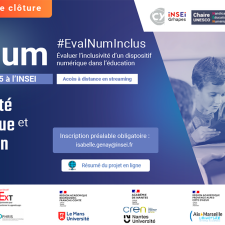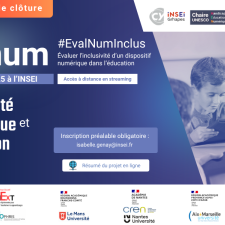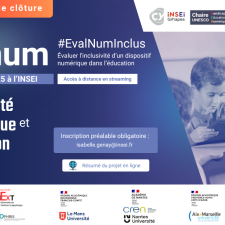Chapitres
Notice
Educational models, configurations and practices - 05 - English
- document 1 document 2 document 3
- niveau 1 niveau 2 niveau 3
Descriptif
A conference proposed and organised by Cned, DMS and The Open University.
Session chair : Ibrahima DIALLO
Online International Collaboration: Teacher education beyond the borders
Speaker : Maria Antonietta IMPEDOVO
Exploring the impact of student teachers’ online collaborative peer reflection
Speakers : Nerys DEFIS, Mathew JONES
Co-authors : Alison GLOVER, Nia COLE-JONES, Rachel WALLIS, Amanda WILLIAMS
Multilingualism in the design and development of e-learning resources for the health sector
Speaker : Anna MAZENOD
Intervention / Responsable scientifique
Thème
Documentation
Online International Collaboration: Teacher education beyond the borders
Online International Collaboration: Teacher Education beyond the borders The Covid-19 pandemic has posed new challenges to the internationalisation of teacher education. We discuss the design of a virtual exchange programme on teacher education in 2021/2022 between France and Austria teacher-students. The paper shows the potentiality of virtual exchange programmes to enhance student teachers' global awareness, improve intercultural understanding, and create a professional self-understanding as a European teacher.
----------------------------------------
Collaboration internationale en ligne : la formation des enseignants au-delà des frontières La pandémie de Covid-19 a posé de nouveaux défis à l'internationalisation de la formation des enseignants. Nous discutons de la conception d'un programme d'échange virtuel sur la formation des enseignants en 2021/2022 entre des enseignants-élèves de France et d'Autriche. L'article montre le potentiel des programmes d'échanges virtuels pour renforcer la conscience globale des élèves-enseignants, améliorer la compréhension interculturelle et créer une autocompréhension professionnelle en tant qu'enseignant européen.
Exploring the impact of student teachers’ online collaborative peer reflection
This article reports on a technology-facilitated micro-teaching project developed in rapid response to unpredictable situations in the public education sector due to the Covid-19 restrictions on face-to-face teaching. The project intended to help trainee teachers develop their response, reflection and collaboration skills by providing opportunities to watch short episodes of teaching before offering formative peer review. Micro-teaching, an activity in which trainee teachers plan, teach and reflect on short lessons, or parts of lessons, is often used in teacher education as a mechanism to aid preparation and reflection, but usually occurs in person. Reflection is widely recognised as a key skill for trainee teachers to develop as part of their teacher training. The trainee teachers were surveyed before and after their involvement in the project. The survey responses and the benefits and challenges identified in supporting the development of teaching skills, including peer reflection, are explored in an online distance learning environment. The results suggest that trainee teachers have improved their reflections and confidence in peer assessment. The most important insight from the micro-teaching activity was the collaborative nature of the project, particularly the reflection with other trainee teachers and the knowledge of other schools.
teacher.
----------------------------------------
Cet article rend compte d’un projet de micro-enseignement facilité par la technologie, développé en réponse rapide aux situations imprévisibles dans le secteur d’enseignement public en raison des restrictions Covid-19 en ce qui concerne l’enseignement en personne. Le projet avait l’intention d’aider les professeurs stagiaires à développer leurs compétences en matière de réaction, de réflexion et de collaboration en leur offrant des occasions de regarder des épisodes courts d’enseignement avant d’offrir une évaluation formative par les pairs. Le micro-enseignement, une activité dans laquelle les professeurs stagiaires planifient, enseignent et réfléchissent à des cours courts, ou à des parties de cours, est souvent utilisé dans la formation des professeurs comme un mécanisme pour aider la préparation et la réflexion, mais généralement il se présent en personne. La réflexion est largement reconnue comme une compétence clé que les professeurs stagiaires doivent se développer dans le cadre de leur formation pédagogique. Les professeurs stagiaires ont été interrogés avant et après leurs participations dans le projet. Les réponses à l’enquête ainsi que les avantages et les défis identifiés pour aider le développement des compétences pédagogiques, y compris la réflexion par les pairs, sont explorés dans un environnement d’apprentissage à distance en ligne. Les résultats suggèrent que les professeurs stagiaires ont amélioré leurs réflexions et leur confiance en l’évaluation par les pairs. La connaissance la plus importante de l’activité de micro-enseignement a été la nature collaborative du projet, en particulier la réflexion avec les autres professeurs stagiaires et la connaissance des autres établissements scolaires.
Multilingualism in the design and development of e-learning resources for the health sector
The pandemic has led many new learners and teaching professionals to engage with distance education for the first time and arguably brought about a cultural shift in the acceptability and perceived normality of blended learning (Hasan and Khan, 2020). Significant inequalities however remain in terms of access to and appropriateness of elearning resources for many learners. Language remains an important potential barrier to access despite the increasing availability of online translation and language learning tools. One area of challenge arises from the often-limited consideration afforded to linguistic aspects in the design and development of learning resources. This paper explores the opportunities and the barriers to embedding multilingualism in the design and development of e-learning resources for a global audience. The paper draws on post-colonialist theory that emphasises the intertwined nature of language, culture and history, and critically contests claims of neutrality of language and knowledge (De Sousa Santos, 2014; Medina, 2013; Pennycook, 1998). De Sousa Santos (2014) for example has put forward the idea of the epistemologies of the South, which seeks to acknowledge the epistemic diversity of knowledge beyond modern Eurocentric conceptualisation and legitimisation of knowledge. The paper is also informed by the author’s earlier work on the multilingual construction of global knowledge on vocational education (Mazenod, 2018). An ethnographic action research (Tacchi et al, 2003) approach characterises the multilingual learning design project underpinning this paper. Data is drawn from five ongoing learning resource production projects in the health sector, and consists of fieldwork notes, observations and series of interviews with learning designers and health content experts involved in the design and development of e-learning resources. By drawing on examples of real-world projects the paper seeks to identify practical recommendations for embedding multilingualism in the design and development process and thus encouraging the production of learning resources that can better meet the needs of learners in different linguistic contexts.
Dans la même collection
-
Modèles, pratiques et configurations pédagogiques - 07 - Francophone
CharlierBernadetteDessusPhilippeGérin-LajoieSergeEl MouhsineSaraAberkaneChaymaeÉvaluer les apprentissages des étudiants à distance : explorations des pratiques dans une université unimodale à distance. / Comprendre la dynamique de co-construction des environnements d
-
Modèles, pratiques et configurations pédagogiques - 06 - Francophone
MolinariGaëlleMraihiSaidaBossuAdelineZytnickiJérémyInteragir en situation de co-présence à distance : le cas du cours synchrone. / Entre interdépendance, autonomisation et autorégulation des acteurs dans les organisations pédagogiques à distance : les
-
Modèles, pratiques et configurations pédagogiques - 04 - Francophone
CharlierBernadetteLeferGaëlleChecchiKévin deDragoneLaetitiaDifférences dans la perception des enseignements hybrides et en présentiels des étudiants : indicateurs de réussite et leurs liens avec le sentiment d'efficacité personnel et la posture pédagogique. /
-
Modèles, pratiques et configurations pédagogiques - 03 - Francophone
BonfilsPhilippeArnetonMélissaBarbeFaustinBobocAncaGuezSarahLa réalité virtuelle au service d'une situation de handicap partagée en formation. / Instruments et environnement capacitant : quelques repères pour un enseignement à distance. / Hybridation de la
-
Educational models, configurations and practices - 02 - English
WhitelockDenisePaoliKirstyBoualiAssyaOtmanineIrinaPorter-SzucsIldikoDeCiccoBarryLearning experience of graduate students in an online course using desktop VR using the Activity theory framework. / Adopting HyFlex in higher education in response to COVID-19: Students' Perceptions
-
Modèles, pratiques et configurations pédagogiques - 01 - Francophone
Padoani DavidGracielaBergeyJean-LucCavignaux-BrosDorothéeHybridation des formations : appréhension des typologies et de leurs évolutions... pour une pédagogie bouleversée ? / La formation à distance et l'expérience apprenant en temps de crise sanitaire.
Sur le même thème
-
Causeries Pédagogie - Enseignement à distance #5 - IA et productivité pédagogique
PorlierChristopheBatierChristopheCauseries Pédagogie - Enseignement à distance #5 - IA et productivité pédagogique
-
Présentation du dossier journée Erasmus
Présentation du dossier en vidéo
-
- Le numérique au quotidien : pratiques et enjeux dans une classe soutenue par une ULIS-collège
AssudeTeresaFeuilladieuSylvianeBussezAlexandraMartinPerrineLe numérique au quotidien : pratiques et enjeux dans une classe soutenue par une ULIS-collège
-
Zsófia Paczolay et Dorian Rivière parlent de leur film "Je suis là"
PaczolayZsófiaRivièreDorianInterview de Zsófia Paczolay et Dorian Rivière pour leur film "Estou Aqui"/"Je suis là", en compétition à la 44ème édition du Festival International Jean Rouch en 2025.
-
Matthew Wolkow parle de son film "Eastern Anthems"
WolkowMatthewInterview de Matthew Wolkow pour son film co-réalisé avec Jean-Jacques Martinod "Eastern Anthems" en compétition à la 44ème édition du Festival International Jean Rouch en 2025.
-
Évaluer des usages du numérique à l'école primaire : un regard didactique sur des pratiques ordinai…
DupréFrédéricÉvaluer des usages du numérique à l'école primaire : un regard didactique sur des pratiques ordinaires
-
Usage du numérique dans une dynamique inclusive : impact d'une pratique coopérative sur l'accès aux…
Louge DupratMagalieUsage du numérique dans une dynamique inclusive : impact d'une pratique coopérative sur l'accès aux savoir.
-
Enjeux, principes et outils de l'observation in situ des usages pédagogiques inclusifs du numérique
BenoitHervéEnjeux, principes et outils de l'observation in situ des usages pédagogiques inclusifs du numérique
-
Le projet GTnum à l'échelle d'un territoire académique : témoignage de Julien Roche
RocheJulienLe projet GTnum à l'échelle d'un territoire académique : témoignage de Julien Roche
-
Un questionnaire académique pour donner à voir les pratiques numériques inclusives
DupréFrédéricBenoitHervéUn questionnaire académique pour donner à voir les pratiques numériques inclusives
-
Évaluer l'inclusivité d'un dispositif numérique dans l'éducation (GTnum) : état de l'art
Petry-GenayIsabelleBenoitHervéÉvaluer l'inclusivité d'un dispositif numérique dans l'éducation (GTnum) : état de l'art. Hervé Benoit et Isabelle Petry Genay, INSEI.
-
Ouverture de la journée GTnum#EvalNumInclus 2025
BenoitHervé"Évaluer l'inclusivité d'un dispositif numérique dans l'éducation"



